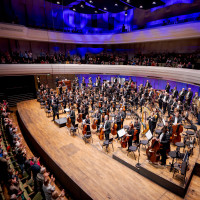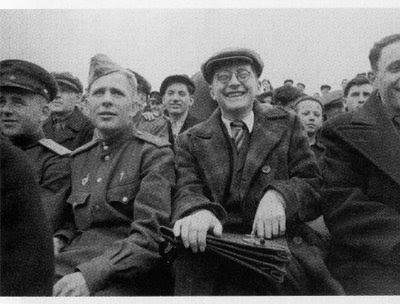Program Booklet
RO NOW: Shostakovich's Symphony No. 6
Saturday , October 11
20:30
hour until approximately 10:15 p.m.
Timeless music poured into a short, powerful evening. Indulge in Shostakovich's intriguing Sixth Symphony: a layered work that interweaves melancholy and biting humor.
📳
Please put your phone on silent and dim the screen so as not to disturb others during the concert. Taking photos is allowed during applause.
Programme
Edvard Grieg (1843-1907)
Piano Concertoin a, op. 16 (1868)
Allegro molto moderato
Adagio
Allegro moderato molto e marcato - Quasi presto - Andante maestoso
Dmitri Shostakovich (1906-1975)
Symphony No. 6 in b, op. 54 (1939)
Largo
Allegro
Presto
After the concert, stick around in Foyer 2 for drinks and live tunes from the Anton Jämtander Trio. The first drink is on us!
What are you going to listen to?
Shostakovich's Sixth Symphony, a masterpiece of edginess and introspection and Grieg's Piano Concerto, a brilliant dialogue between piano and orchestra, steeped in romanticism and northern fervor. A real treat for your weekend.
Edvard Grieg
Although it was recognized early on that Edvard Grieg possessed musical talent - he was taught piano and theory by his mother from the age of six - it was the famous Norwegian violinist Ole Bull who convinced Grieg's parents to let their fifteen-year-old son study at the Leipzig conservatory. During his first year of study in 1858, he heard Clara Schumann perform her late husband Robert's Piano Concerto. Deeply impressed, he decided to write a piano concerto himself although it was another ten years before Grieg put the plan into action. Meanwhile, he had been back in his homeland for some time where he had been profoundly influenced by Norwegian folk music. So too in his Piano Concerto whose final rondo is based on a well-known Norwegian folk dance, the "halling.
The 1869 premiere in Copenhagen was a great success, although Grieg, due to commitments elsewhere, did not play the solo part. He himself, however, was far from satisfied, and in the years that followed he revised the work no fewer than seven times, the Last only a few weeks before his death in 1907. The Piano Concerto ended up being the only solo concerto Grieg wrote. He did begin a second concerto in 1882, but left it at only a few sketches.
Dmitri Shostakovich
It was only barely a year ago that Dmitri Shostakovich had rehabilitated himself with his Fifth Symphony with the Soviet authorities, when he announced in the Journal of Literature that he planned to compose a vocal-instrumental symphony in memory of Lenin: "It is an incredibly difficult task to portray the titanic stature of the leader in music, and I am acutely aware of this. Therefore, when I talk about my symphony, I see that its basis is not in historical events or biographical facts, but very generally in the higher idea of the work. I have long been intensely concerned with the idea of how the stature of the leader can be expressed by musical means. I designed my symphony as a work for orchestra, chorus and soloists. I have carefully studied all the poetry and prose in honor of Vladimir Ilyich."
Repeatedly Shostakovich announced works he had no intention of writing at all, in order to gain time and work on something else in peace. In the years 1938-1939, he actually worked on the purely instrumental Sixth Symphony, which was completely overshadowed at the Festival of Soviet Music in Moscow by the success of Prokofiev's patriotic cantata "Alexander Nevsky. The Soviet authorities convened a meeting on the symphony immediately after its premiere on Nov. 5, 1939. Conductor Yevgeny Mravinsky was convinced though and performed the symphony repeatedly and so did Leopold Stokowski, who premiered the work abroad: "In each symphony, Shostakovich shows himself as a master who continuously develops his creative imagination and musical self-awareness. He reaches new heights in the Sixth Symphony, especially in the first movement, where the succession of harmonic and melodic turns acquires a special expressiveness and original timbre. At first hearing, these turns sound strange, perhaps even incomprehensible, as if they want to hide their meaning from us. On repeated listening, however, everything becomes clear, everything gains tremendous depth."
Prefer it on paper? Download a condensed printable version of this program.
Biographies

Residentie Orkest The Hague
-peter-brenkus.jpg/c9d3cc043aa51c847a817fd26d5ceb65.jpg)
Daniel Raiskin
.jpg/152d09fac862424bce5bbb1f02e0069b.jpg)
Antti Siirala

Christiaan Kuyvenhoven
In RO NOW: The Podcast get an exclusive preview of the concert RO NOW: Shostakovich 6 by presenter Christiaan Kuyvenhoven.


RO QUIZ
Q: What was one of Shostakovich's greatest passions?-
Chess
Good answer: soccer
Shostakovich was a perfectionist. All the clocks in his apartment ran exactly the same and he tested the Russian postal service by regularly sending himself tickets . But above all, he loved soccer and whenever possible, he sat in the stands at his favorite soccer club: Zenit Leningrad. In addition, he was even qualified as a referee and once composed a ballet that revolved around a soccer team.
-
Soccer
Good answer: soccer
Shostakovich was a perfectionist. All the clocks in his apartment ran exactly the same and he tested the Russian postal service by regularly sending himself tickets . But above all, he loved soccer and whenever possible, he sat in the stands at his favorite soccer club: Zenit Leningrad. In addition, he was even qualified as a referee and once composed a ballet that revolved around a soccer team.
-
Pole vault
Good answer: soccer
Shostakovich was a perfectionist. All the clocks in his apartment ran exactly the same and he tested the Russian postal service by regularly sending himself tickets . But above all, he loved soccer and whenever possible, he sat in the stands at his favorite soccer club: Zenit Leningrad. In addition, he was even qualified as a referee and once composed a ballet that revolved around a soccer team.

Good answer: soccer
Shostakovich was a perfectionist. All the clocks in his apartment ran exactly the same and he tested the Russian postal service by regularly sending himself tickets . But above all, he loved soccer and whenever possible, he sat in the stands at his favorite soccer club: Zenit Leningrad. In addition, he was even qualified as a referee and once composed a ballet that revolved around a soccer team.
Today in the orchestra
Help The Hague get music!
Support us and help reach and connect all residents of The Hague with our music.


View all program booklets
Be considerate of your neighbors and turn down your screen brightness.


